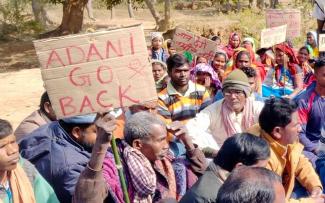Five villages in the Barkagaon block of Hazaribagh, Jharkhand - Gondalpara, Gali, Balodar, Hahe, and Phulang - have steadfastly refused to give their land to Adani Enterprises. This company was controversially allotted the Gondalpara coal block in March 2021 by the Modi government. This block was among 214 coal blocks whose previous allotments were canceled by a landmark Supreme Court order in 2014, citing irregularities. Earlier, since 2004, the block was under the Damodar Valley Corporation (DVC). Despite two decades of consistent resistance from the villagers, the coal block was handed over to Adani Enterprises.
The gram sabhas of these five villages have unanimously passed statutory resolutions rejecting the proposed land acquisition. However, the administration dismissed these resolutions as mere "protests," while Adani Enterprises escalated the conflict by filing 21 criminal cases against the protesting villagers. A total of 331 men and women have been implicated in these cases simply for asserting their legal right to refuse land acquisition. The villagers have participated in all general body meetings and public hearings on the matter, consistently rejecting the proposals both in writing and verbally. They have categorically stated that they are content with their current livelihoods and will not sacrifice their only source of sustenance for the sake of coal mining.
Since April 12, 2023, the villagers have been staging a continuous sit-in protest in Gondalpara, which reached its 641st day on January 21, 2025. The protestors remain resolute, determined to protect their lands, livelihoods, and environment from the devastating effects of the project.
Under the proposed plan, Adani Enterprises would acquire 1,268.08 acres of land for coal mining. Of this, 551.59 acres belong to the farmers and villagers of Gondalpara, Gali, and Balodar, 542.75 acres are forest land, and 173.74 acres are classified as gair-majarua (public and private lands). These villages are located near or along the banks of the Badmahi (also called Badki) river, a critical water source for the region. The lands are highly fertile and irrigated, yielding multiple crops annually. The area is particularly renowned for its high-quality jaggery produced from sugarcane and its abundant rice production, with thousands of tonnes procured every season through Primary Agricultural Credit Societies (PACS).
The project threatens to destroy 960 acres of highly productive, irrigated farmland, which would result in an environmental catastrophe. The dense forests surrounding the area, once classified as "No-Go Zones" until 2014 due to their ecological importance, are home to rare medicinal plants and valuable timber species. These forests not only sustain the livelihoods of thousands of families who collect forest produce but also serve as a critical habitat for wildlife. Additionally, the Badmahi river, a major tributary of the Damodar River system, originates here. The river sustains dozens of villages beyond the proposed mining zone, and its destruction could severely impact the region’s rainfall patterns and groundwater table, turning the fertile land into a barren wasteland.
The area also forms a crucial part of the Elephant Corridor project, which would be jeopardized by the mining operations. Villagers and environmentalists warn that no amount of monetary compensation can offset the devastating impact on human and wildlife populations, as well as the irreparable environmental damage. Alarmingly, noise pollution caused by preliminary activities for the project has already begun to disturb local wildlife.
Baleshwar Kumar Yadav and Devnath Mahto, residents of the affected villages, expressed their frustration, pointing out that the coal block was initially reserved for a public-sector enterprise. "Now, it has been handed over to Adani's private company, where only the corporation will enjoy profits, while local people will bear the brunt of the losses and devastation," they said.
In a significant move, all the landowners of the five villages submitted a written declaration at the Deputy Commissioner's office on July 19, 2024, firmly stating their refusal to sell or give up their land under any circumstances. They have demanded that the Ministry of Coal and the Prime Minister's Office immediately cancel the allotment of the Gondalpara coal block to Adani Enterprises.
The villagers’ resistance is not just about land - it is a fight to protect their heritage, environment, and future generations. Their struggle exemplifies the larger battle against corporate exploitation, environmental degradation, and the erosion of local livelihoods in India.









